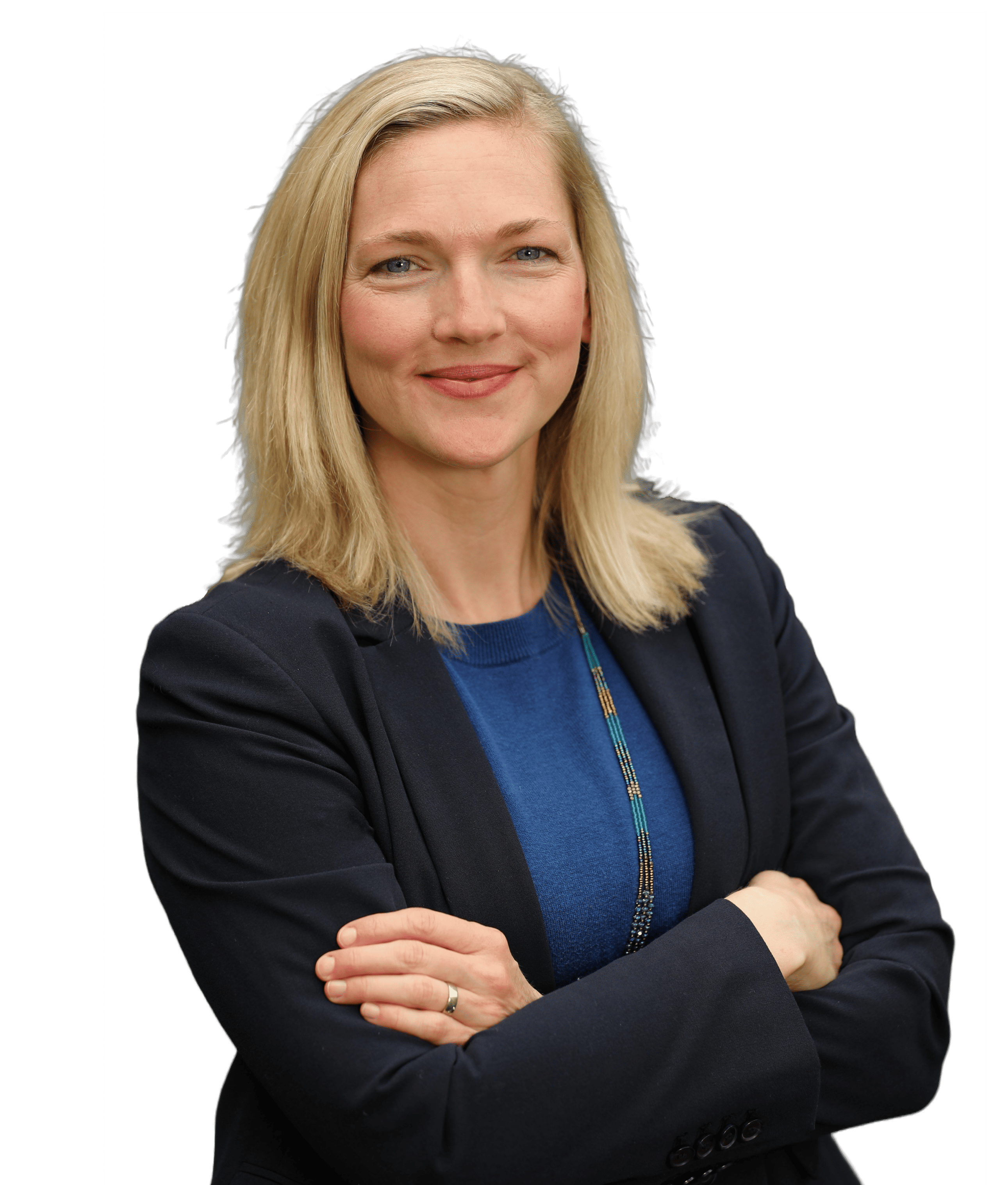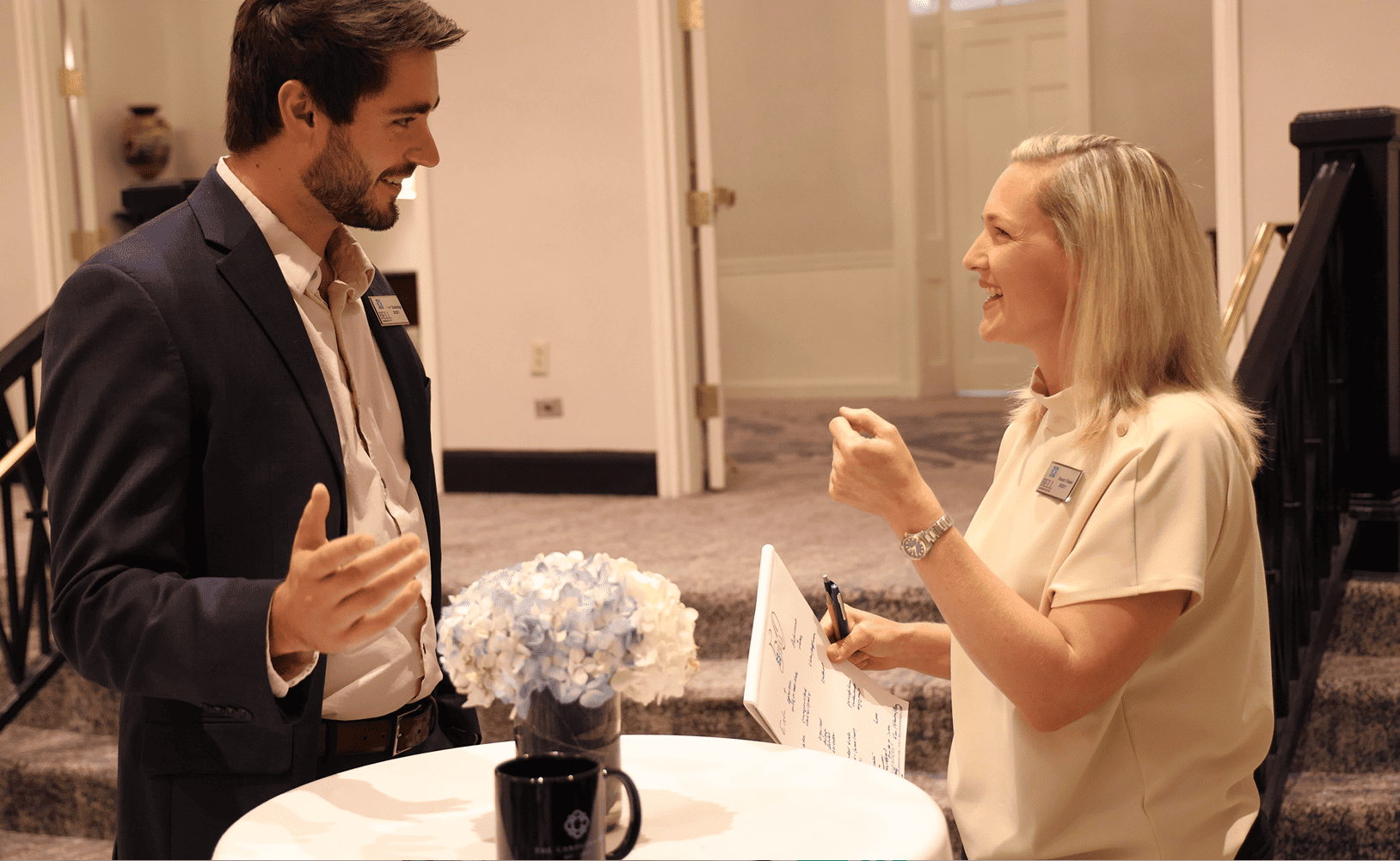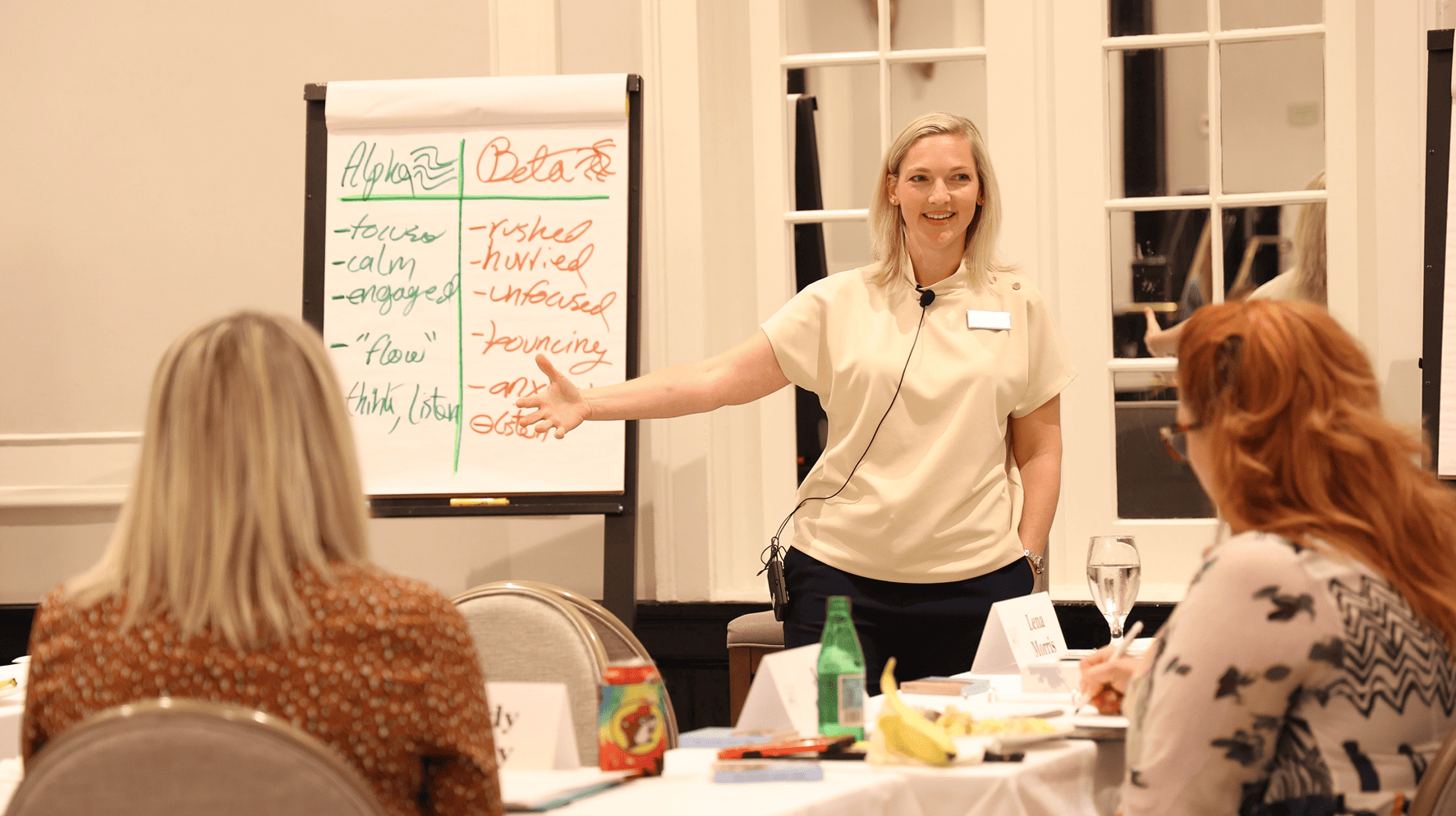TRAINING SPOTLIGHT
From Patients to Leaders:
Helping Others Through Change
Susan Gisler
Leadership Trainer, Speaker & Coach

TRAINING SPOTLIGHT
From Patients to Leaders: Helping Others Through Change
Susan Gisler
Leadership Trainer, Speaker & Coach
SUSAN GISLER
Leadership Trainer, Speaker & Coach
Bell Leader since 2021
Email Susan
Q. Do you want to start by sharing with us a little bit of your professional background?
A. I started my career as a physical therapist. I focused on helping people with neurological disorders, stroke, or after an accident or illness. Part of that role is helping people through the process of figuring out what might be possible for them to do, using techniques and skills, science, the available technology, and making sure we're clear on what they actually want to be able to do. I focused on trying to keep sessions fun for them even though they'd gone through something life altering, something often terrible for them and their families. Working to keep patients inspired and encouraged and having some sort of hope, finding something for them to be engaged with - that was what was most enjoyable. There’s something really amazing about being able to do that kind of work with folks.
Q: Did you notice a difference in patients who had a sense of hope in their approach?
A: Yes. It's so hard to want to participate in something as challenging as learning to walk again or use an arm again. It's so hard to do it, period. And you can't will someone else into wanting to work on it. So, it was often finding a way for them to trust you enough so that you could help them engage in the work. For people who get to the point of being able to say, “OK, fine. Let's dig in and try this,” or “This is what I want to work on today!” - that’s wonderful. If you can get people to that point, then you have a good chance of helping them. And once I moved into more formal leadership roles, I found this approach to be quite similar to coaching peers, direct reports, and taking teams through new initiatives or projects.
Q: During your work in physical therapy, you transitioned into leadership early in your career, correct? What was that like for you?
A: I had planned to stay in direct patient care for my career. It just kept coming up that I was involved in teaching, mentoring, and then was asked to start leading some meetings and a small team. And I found that I really enjoyed those aspects of work as well. It started with a team lead position, then a 50/50 split position where I saw patients 50% of the time and worked with educating staff, working with students from across the country, and building new programs and initiatives. Other leaders could see or hear how you handled situations and provide feedback, and I started to see that I was able to have those challenging conversations and come out with strong relationships. That role led to my first full time management position and then ultimately into a role leading other leaders.
Q: As someone who has led teams, what do you think are some of the most important things you’ve personally learned about being a leader?
A: In many leadership roles, you have to make so many decisions throughout each day, and the pace is so fast. You're making decisions while making other decisions. You're constantly on, and you're often on for more hours a day than you likely should be. Sometimes you nail it. And sometimes you push too fast, become too independent, choose the wrong priority, inadvertently hold someone back, or have too many things overlapping at once with competing demands and time frames.
Also, there's often not a right or a wrong answer or approach. Sometimes you need to choose the least bad option or the best of three decent options. And you might not truly know for five to seven years if one would have been a better choice. You end up having to use your judgment and surround yourself with people with wisdom and experience. What I consistently found was the more you can cause others to want to do their best, to want to give you good and timely information, and the more they trust you and you them, the better the results.
Q: I can see how this experience would give you an appreciation for what clients are going through when they’re presented with new knowledge and more things they have to do to build their skills with so much they’re already doing. How has that experience translated into your work at Bell?
A: One tip I have is I think that if you're going to build your skills, it’s much more doable to start with actions and changes you can implement on any given day of the job. Try having something on your mind that you're ready with: “I'm going to go into this meeting thinking about this.” Because otherwise you're likely just going to do what you've always done. To interrupt that and to change it in the moment requires you to plan it out. Think it out. You kind of have to force it so that in the moment you'll say, “OK, now I'm going to try something different.” And then when you fail at that because it's not the way you've always done it or it's awkward, taking that pressure off and instead of saying, “OK, well, that wasn't perfect; I'll never try it again,” saying, “Alright, let's try it again. Here we go. Here's another opportunity.” It’s making it a conscious part of your day to try to approach something in a different way than you normally would.
Q: Change seems to be a recurring theme for you; do you have any specific thoughts on change, whether for an organization, for ourselves as leaders, or those we lead?
A. I think it’s incredibly important to understand how long change takes. If you're going to implement a new process or strategy, I think an area we often get trapped is thinking that everyone's going to accept it at the same time, or that people will be happy about it or excited about it, especially if it's going to have a big upside for them over time. But the stronger you come in with, “Isn't this wonderful?” The more that can push others to feel like they need to have more reasons why it's not wonderful. Even when it’s something that you would say, “There is no way that someone could be upset about this. This is great news!” So, I think that could be a big trap for leaders—not just new leaders, senior leaders also. And it gets harder the further away you get from the work, the further you are from the frontline and realizing how change feels when you're doing the job, the work, whatever the product and services are that you do. It's so hard to remember what it feels like and to understand how what senior leadership thinks is “a little tweak,” impacts so much more than that. And it's just going to take a lot longer than we want it to. And that's OK because if we want the change to be lasting and the right type of change, it takes time.
Q: What do you think about change in terms of helping individuals to change personally?
A. Since I’ve been with Bell Leadership, I think one of the biggest learnings I’ve had is that effective leadership really is as difficult as it seems. It feels like that when you're doing it, but the more you study it, the more you realize that it truly is. And it's typically not the tasks; the tasks can be difficult, for sure. But we ourselves are complex, and then leading other people who are also complex and have tons of strengths and lots of weaknesses—that’s hard. And you really can't expect others to change just because you’d like for that to occur. It comes back a little to what I was saying about working with patients in physical therapy. You have to get people to a place where they are willing to engage and work towards change before you can really expect that to happen, and likely it'll be in small increments. If they have a good coaching session with you or someone else, meaning they understand their impact, that you plan together something they can do and want to be successful with it - that gives you something to work with.
Q: Do you have any other insights for those newly in leadership or just stepping into a leader role?
A. I think I would say, tell yourself, “You’re not necessarily going to be very good at this right away.” And that’s okay. In fact, it’s not just okay, it’s great. So, it's shifting perspective from fear of failure to “whew, this is OK,” to then “Whoa, this is wonderful.” We get to do all of these things. We get to keep working on being better, building ourselves, improving whatever it is that we're working on. And I think that is true for anyone at any level. The work that we’re doing at Bell Leadership applies to everyone. It doesn't matter their background, their tendencies, their approach. If they're dipping their toe into being a supervisor, or they've been a CEO for 30 years - it's about being the best that you can be, starting with wherever you are. The level of skill that you need changes as your job gets bigger, the degree to which you utilize certain leadership skills changes, but the skills that make you a highly effective as a leader apply at all levels of leadership.
Some additional advice I’d offer to new leaders is when you learn more about your strengths and weaknesses, find a way to ask yourself “Am I making this decision, having this conversation—whatever it is—because of me and my approach, my needs? Or am I doing it because it's what the team, the project, the people involved need?” Because it's a nice check point of either “Yes, let’s do this!” or an opportunity to stop and do something that’s more effective. It’s one way you can keep getting better and learn from yourself - study yourself so that you can see your own patterns coming and try to get ahead of them.
Watch Susan In Action
She connects quickly with others, helping to find innovative solutions that are sustainable and efficient by engaging in difficult conversations with teams going through transition, sustaining calm in emergency situations, and coaching people through professional challenges. Clients that work with Susan appreciate her distinctive approach and ability to promote engagement and understanding.
“You cannot change your past behaviors, but you can learn and move forward with the knowledge and skills to build your best life.”
Susan Gisler
Leadership Trainer, Speaker & Coach
Bell Leadership Institute


 CLICK TO READ Q&A WITH SUSAN
CLICK TO READ Q&A WITH SUSAN
